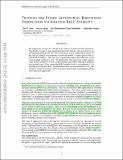Training for faster adversarial robustness verification via inducing Relu stability
Author(s)
Xiao, Kai Yuanqing; Tjeng, Vincent; Shafiullah, Nur Muhammad Mahi.; Mądry, Aleksander
DownloadAccepted version (753.6Kb)
Open Access Policy
Open Access Policy
Creative Commons Attribution-Noncommercial-Share Alike
Terms of use
Metadata
Show full item recordAbstract
We explore the concept of co-design in the context of neural network verification. Specifically, we aim to train deep neural networks that not only are robust to adversarial perturbations but also whose robustness can be verified more easily. To this end, we identify two properties of network models - weight sparsity and so-called ReLU stability - that turn out to significantly impact the complexity of the corresponding verification task. We demonstrate that improving weight sparsity alone already enables us to turn computationally intractable verification problems into tractable ones. Then, improving ReLU stability leads to an additional 4-13x speedup in verification times. An important feature of our methodology is its “universality,” in the sense that it can be used with a broad range of training procedures and verification approaches.
Date issued
2019-05Department
Massachusetts Institute of Technology. Department of Electrical Engineering and Computer ScienceJournal
7th International Conference on Learning Representations, ICLR 2019
Publisher
ICLR
Citation
Xiao, Kai Y. et al. “Training for faster adversarial robustness verification via inducing Relu stability.” Paper presented at the 7th International Conference on Learning Representations, ICLR 2019, New Orleans, Louisiana, May 6 - 9, 2019, ICLR © 2019 The Author(s)
Version: Author's final manuscript